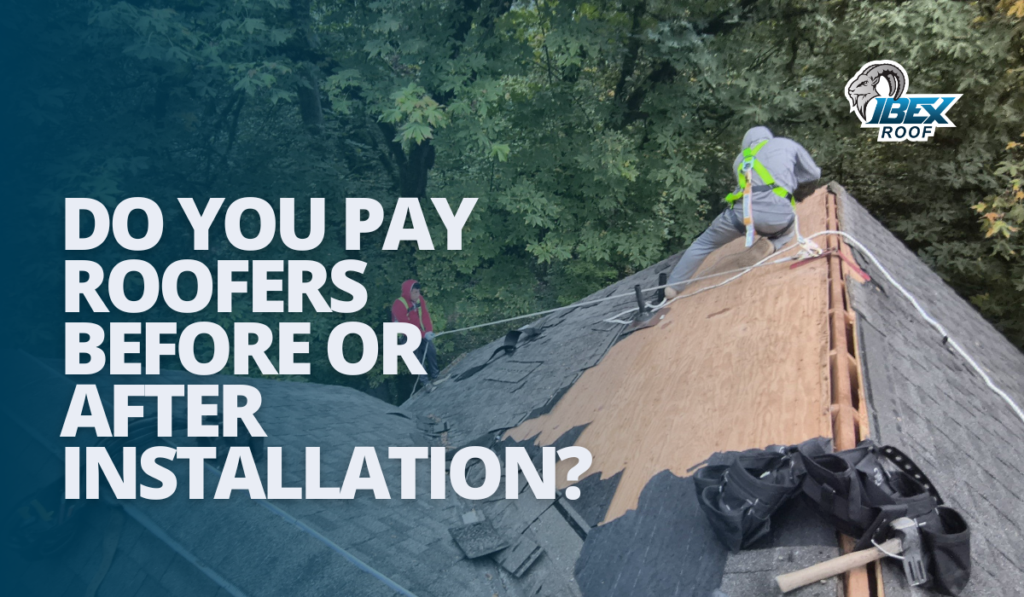You’ve just gotten quotes from a few roofers in Portland, and now they’re talking deposits, schedules, and payment terms. One contractor says 50% upfront. Another wants everything before the job starts. You’re thinking: Should I really hand over that much money before anyone even climbs a ladder?
Knowing when and how much to pay can make or break your roofing experience. And here's one rule every homeowner should know: never pay for a roofing job upfront. Let’s walk through how payment schedules should actually work, what’s normal in the industry, and how to protect your investment.

When you’re planning a roof replacement, understanding the payment schedule is just as important as choosing the right shingles. Many homeowners aren’t sure how much to pay and when, and that’s where a clear payment plan comes in.
A reliable contractor will break down the payment terms before any work starts. That usually means splitting the total cost into stages so you’re not paying too much too soon.
This setup protects both you and the contractor. It gives you control over your investment while making sure the roofer has what they need to move forward. Always ask for this kind of breakdown before signing anything.
Note: According to Angi, most reputable contractors request no more than 30% upfront. Avoid contractors asking for full payment before any work begins.
Not every roofing job follows the same payment plan. The structure depends on a few key things, and knowing them helps you ask the right questions before you agree to anything.
Larger projects with more work involved often come with more steps in the payment schedule. The type of materials used and how quickly they can be delivered can also change how and when you’re asked to pay.
If your roof is part of an insurance claim, there may be delays or split payments coming through. Some roofers also offer financing options, which can change how you structure payments. Talk through these details with your contractor so you’re not surprised later.
Tip: Insurance-funded jobs may have split checks, mortgage company involvement, or escrowed funds. Discuss these upfront.
Some roofing offers sound great until you look closer. Knowing what red flags to watch for can save you money and stress in the long run.
If a roofer asks for full payment or cash upfront, that’s a big warning sign. A reputable contractor will never pressure you to pay before any work is done.
A clear contract, valid insurance, and references should be standard. If any of these are missing, it's best to walk away. Trust matters, and a scam often starts with cutting corners on paperwork.
Bonus Insight: According to the BBB, roofing contractors are among the most complained-about service providers due to scams and poor practices.
When you hire a roofer, you want to know your money and your home are safe. The best way to do that is by making sure every detail is clear before the first nail goes in. A reputable contractor will be open about the payment schedule, materials, and start dates.
The terms of the contract should spell out exactly what you’re paying for and when payments are due. Having this in writing protects both you and the contractor, and it leaves no room for confusion.
Secure payment methods like check or credit card are safer than cash. And remember, never pay the full amount upfront. Pay as the work moves along and only release the final balance once the project is completed to your satisfaction.
Pro Tip: Request a copy of the contractor’s general liability insurance and check expiration date and coverage amounts.
Before you hand over the final payment, take time to do a careful walk-through with your roofer. This is your chance to make sure everything was completed to your satisfaction and that your home is left in good condition.
Use this step to review any small fixes or clean-up tasks. A good contractor will handle these without hesitation. Hold onto the remaining balance until the list is complete.
Only release the final payment when the work is finished, the warranties are in your hand, and the payment terms have been met. This step keeps the contractor motivated to follow through on every detail.
Checklist: Include confirmation of debris removal, proper ventilation installation, manufacturer registration, and visual inspection.
Paying your roofer isn’t just about writing a check. It’s also about protecting yourself from future claims. That’s why lien waivers and proper documentation are so important in every contractual agreement.
Each time you make a payment, ask for a conditional waiver. Once the funds clear, request an unconditional waiver. This proves that the contractor and any subcontractors have been paid and can’t file a lien on your home.
Keep all documents organized. Signing a contract, tracking when payments are due, and storing receipts can save you stress later if you sell your home or file a warranty claim. Paying by check or credit card also helps you keep a clear record.
Filing Tip: Organize documents digitally and physically. These may be needed for future home sales or warranty claims.
Every homeowner’s situation is a little different. That’s why it helps to talk with a roofing contractor about which payment method works best for you. Whether you’re paying by credit card, cash, or check, the right contractor will explain the payment schedule in detail.
Some companies even offer financing options to spread the cost of a new roof into manageable monthly payments. Asking upfront can help you plan your budget and avoid surprises.
We’ll walk you through deposits, milestones, and final payment, no pressure, no surprises.
Call IBEX Roof today for a free estimate. We’ll explain your payment schedule, review financing options, and make sure you feel confident before the project begins.